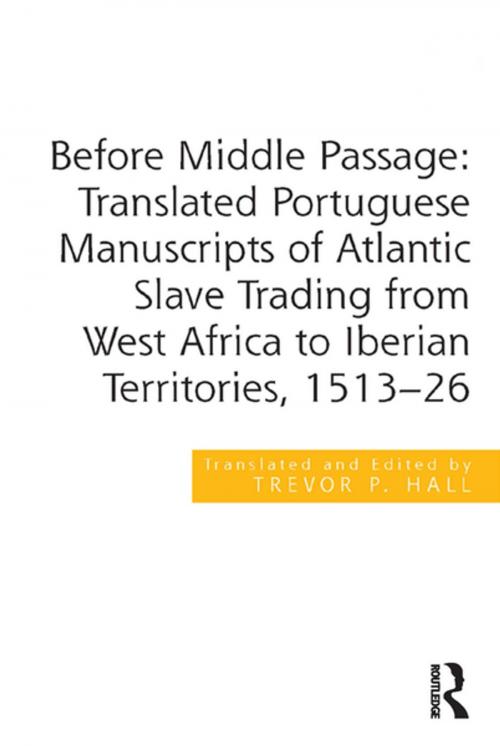Before Middle Passage: Translated Portuguese Manuscripts of Atlantic Slave Trading from West Africa to Iberian Territories, 1513-26
Nonfiction, History, Modern, 17th Century, Social & Cultural Studies, Social Science, Discrimination & Race Relations| Author: | Trevor P. Hall | ISBN: | 9781317175711 |
| Publisher: | Taylor and Francis | Publication: | March 9, 2016 |
| Imprint: | Routledge | Language: | English |
| Author: | Trevor P. Hall |
| ISBN: | 9781317175711 |
| Publisher: | Taylor and Francis |
| Publication: | March 9, 2016 |
| Imprint: | Routledge |
| Language: | English |
On the 20th of January 1526, the Santiago left Lisbon bound for Africa with a cargo of brass and tin bracelets, round bells, barber basins and cloth; by early October the ship was back in Portugal with a very different cargo, 108 enslaved Africans. With chilling detachment the ship’s trading log records the commodification of human beings, the prices paid for them, the sums received for their sale and the number who did not survive the crossing. Whilst this log may be extremely rare, it is clear from another surviving document, the receipt book of the customs office of the Portuguese Cape Verde Islands, that such voyages were commonplace in the early years of the sixteenth century. The bulk of this volume consists of a translation into English of the receipt book from the customs office of the Cape Verde Islands. In it Portuguese customs agents recorded import duties on over 3,000 slaves transported from nearby West Africa in 36 ships. The customs officers named the slave traders, ships, officers, crew, and outfitters of the ships, as well as the price of each slave and the import duty collected by the Portuguese government and the Catholic Church. A second section of the customs book provides details of export taxes paid on c.600 African slaves by merchants from Portugal, Spain, and the Spanish Canary Islands, when they exchanged European merchandise for slaves. The final chapter of the volume translates the Santiago’s log, providing an example of an actual slave trading expedition. Taken together these documents open a rare window into the workings and scope of the early Atlantic slave trade.
On the 20th of January 1526, the Santiago left Lisbon bound for Africa with a cargo of brass and tin bracelets, round bells, barber basins and cloth; by early October the ship was back in Portugal with a very different cargo, 108 enslaved Africans. With chilling detachment the ship’s trading log records the commodification of human beings, the prices paid for them, the sums received for their sale and the number who did not survive the crossing. Whilst this log may be extremely rare, it is clear from another surviving document, the receipt book of the customs office of the Portuguese Cape Verde Islands, that such voyages were commonplace in the early years of the sixteenth century. The bulk of this volume consists of a translation into English of the receipt book from the customs office of the Cape Verde Islands. In it Portuguese customs agents recorded import duties on over 3,000 slaves transported from nearby West Africa in 36 ships. The customs officers named the slave traders, ships, officers, crew, and outfitters of the ships, as well as the price of each slave and the import duty collected by the Portuguese government and the Catholic Church. A second section of the customs book provides details of export taxes paid on c.600 African slaves by merchants from Portugal, Spain, and the Spanish Canary Islands, when they exchanged European merchandise for slaves. The final chapter of the volume translates the Santiago’s log, providing an example of an actual slave trading expedition. Taken together these documents open a rare window into the workings and scope of the early Atlantic slave trade.















